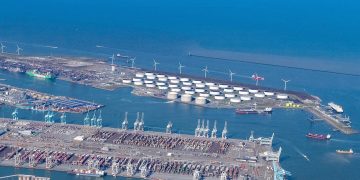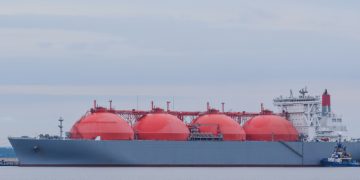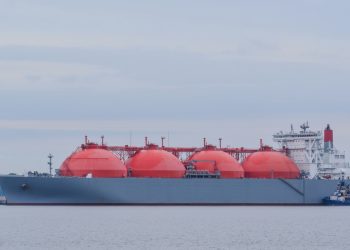A newly released white paper examines the potential role of nuclear energy in supporting the maritime sector’s decarbonization.
This extensive study titled “The role of nuclear in shipping decarbonization” has been conducted by the New Energies Coalition, as part of one of its working groups led by BV, with the valuable contribution of CMA CGM, PSA International, and ONET. The white paper explores how nuclear power, including emerging small modular reactor (SMR) technologies, could be deployed for marine propulsion, coastal near-shore power generation, and on-land energy production within port premises.
It also provides an assessment of the state of technological readiness, environmental benefits, regulatory landscape, and economic viability. The whitepaper has explored the potential of nuclear power as a viable solution for marine propulsion, coastal power generation, and port-based energy production.
Key findings
-
Technological readiness: Both Generation III+ and emerging Generation IV small modular reactors (SMRs) show promise for maritime applications. While some designs are already operational or nearing commercialization, others are advancing rapidly through development stages.
-
Environmental benefits: Nuclear propulsion and power generation offer a carbon-free alternative that aligns with stringent emission regulations and global decarbonization goals. This technology could significantly reduce the maritime sector’s environmental footprint.
-
Regulatory landscape: While existing international conventions provide a foundation, there is a clear need for updated and harmonized regulations. Ongoing efforts by organizations such as the IAEA, IMO, and national regulators will be crucial in creating a comprehensive framework for maritime nuclear applications.
-
Economic viability: As alternative fuel production may struggle to meet demand, nuclear energy could become an economically competitive option and bring additional business benefits, especially as SMR designs reach industrial-scale production.
-
First movers and pilot projects: Several ports and shipping routes could be considered as potential early adopters. Pilot projects and state-sponsored initiatives will be essential in demonstrating the feasibility and safety of maritime nuclear applications.
-
Challenges and opportunities: Key challenges include regulatory harmonization, supply chain development, and public acceptance. However, these challenges also present opportunities for innovation, international cooperation, and industry leadership.
-
Timeline for deployment: A plausible timeline suggests that with concerted effort, we could see commercial deployment of nuclear-powered vessels by 2040–2045, with earlier projects for port-based SMRs and near-shore floating nuclear plants.
According to the study, nuclear power has the potential to play a significant role in the future of maritime transportation and port operations. However, realizing this potential will require coordinated efforts from industry stakeholders, regulatory bodies, and governments. The next decade will be crucial in setting the stage for the integration of nuclear technology into the maritime sector. As the industry moves forward, continued research, pilot projects, and international dialogue will be essential to address remaining technical, regulatory, and social challenges.
As such, the following areas require further analysis and development:
-
Radioactive waste management: There is a pressing need to develop comprehensive safety guidelines for the management of radioactive waste and spent fuel from SMRs. This aspect is crucial for the long-term sustainability and public acceptance of maritime nuclear applications.
-
Crew training and qualifications: Developing specific training programs and qualification standards for crew members operating nuclear-powered vessels is essential. This will ensure the safe operation of these advanced technologies and compliance with radiological protection standards.
-
Cybersecurity: Given the prevalent threat of industrial espionage and cyberattacks, it is imperative to integrate robust cybersecurity requirements within the international nuclear security framework. This integration is crucial for protecting nuclear assets in the maritime sector.
-
Insurance and shared liability: The current lack of standardized maritime insurance covering nuclear material transport and nuclear risks poses a significant challenge. There is a need to adapt conventional liability frameworks to accommodate the unique aspects of maritime nuclear applications, potentially involving shared responsibility among ship operators, owners, and SMR developers. Similarly, further analysis is required concerning financing structures that could support the supply chain and developers.
The white paper reinforces the urgent need for cross-sector collaboration to prepare the path for nuclear energy in maritime, and outlines the milestones and conditions necessary for its responsible implementation over the coming decades.
… said Matthieu de Tugny, President, Bureau Veritas Marine & Offshore
To remind, an EMSA initiated a study on the potential for nuclear-electric ships had found that nuclear power for shipping seems to be a potential pathway for contributing to the decarbonization of the sector, but it presents a series of challenges that must first be addressed, including production, safety, security, training, and the liability and insurance regime.



























































